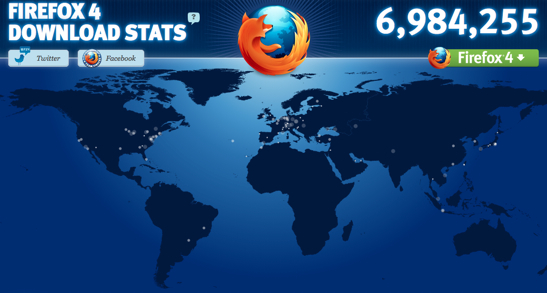Maybe it’s time for Microsoft’s Internet Explorer team to reconsider that whole Windows XP thing?
Firefox 4 clocked about 5 million downloads on its first day and is fast approaching has already topped 7 million this morning, as the new browser from Mozilla attracts huge interest from around the world.
That doesn’t match the record-breaking performance of Firefox 3, but it trounces the 2.35 million downloads that Microsoft reported in the first 24 hours after the Internet Explorer 9 release.
But keep in mind that Microsoft is voluntarily limiting its market, not only by making Internet Explorer exclusive to Windows but also by declining to make the new browser work on Windows XP. Even though Windows XP is nearly 10 years old at this point, more than 40 percent of Internet users are still clinging to it, putting IE9 at a disadvantage in the numbers game by not supporting XP.
Firefox, in contrast, continues to support Windows XP. Mozilla knew coming in that it would have a built-in advantage, based on Microsoft’s choice to support only the newer Windows Vista and 7.
“That’s a decision that they get to make, but it sure did surprise us, because the best metrics that we’ve got say 40 to 50 percent of the web is still on XP. That’s too big for us to just leave them behind,” said Johnathan Nightingale, the Firefox engineering director, in a recent interview.
[Related Post: Firefox 4 Do Not Track: How it works, what it really means]
Why no IE9 on XP? Microsoft’s reasoning is that browsers “should require the modern graphics and security infrastructure that have come along since 2001.” The company says in a statement that “Internet Explorer 9 is intended to be run on a modern operating system in order to build on the latest hardware and operating system innovations.”
Of course, it’s also in Microsoft’s business interest to get people to buy a new Windows version.
The latest browser market-share stats, from just before the release of the new browsers, put Internet Explorer at 56.8 percent, down from 68 percent two years ago. Firefox has held relatively steady over that period, but the big gainer has been Google Chrome, which rose up from practically nothing to now boast nearly 11 percent of the worldwide market.
And Google this morning looked to build on that momentum, releasing a beta of its Chrome 11 browser with advanced speech-recognition capabilities and other new features.
And yes, for the record, Chrome 11 does work on Windows XP (and Macs).
Todd Bishop of GeekWire can be found on Twitter and Facebook when he’s not installing browser betas.




